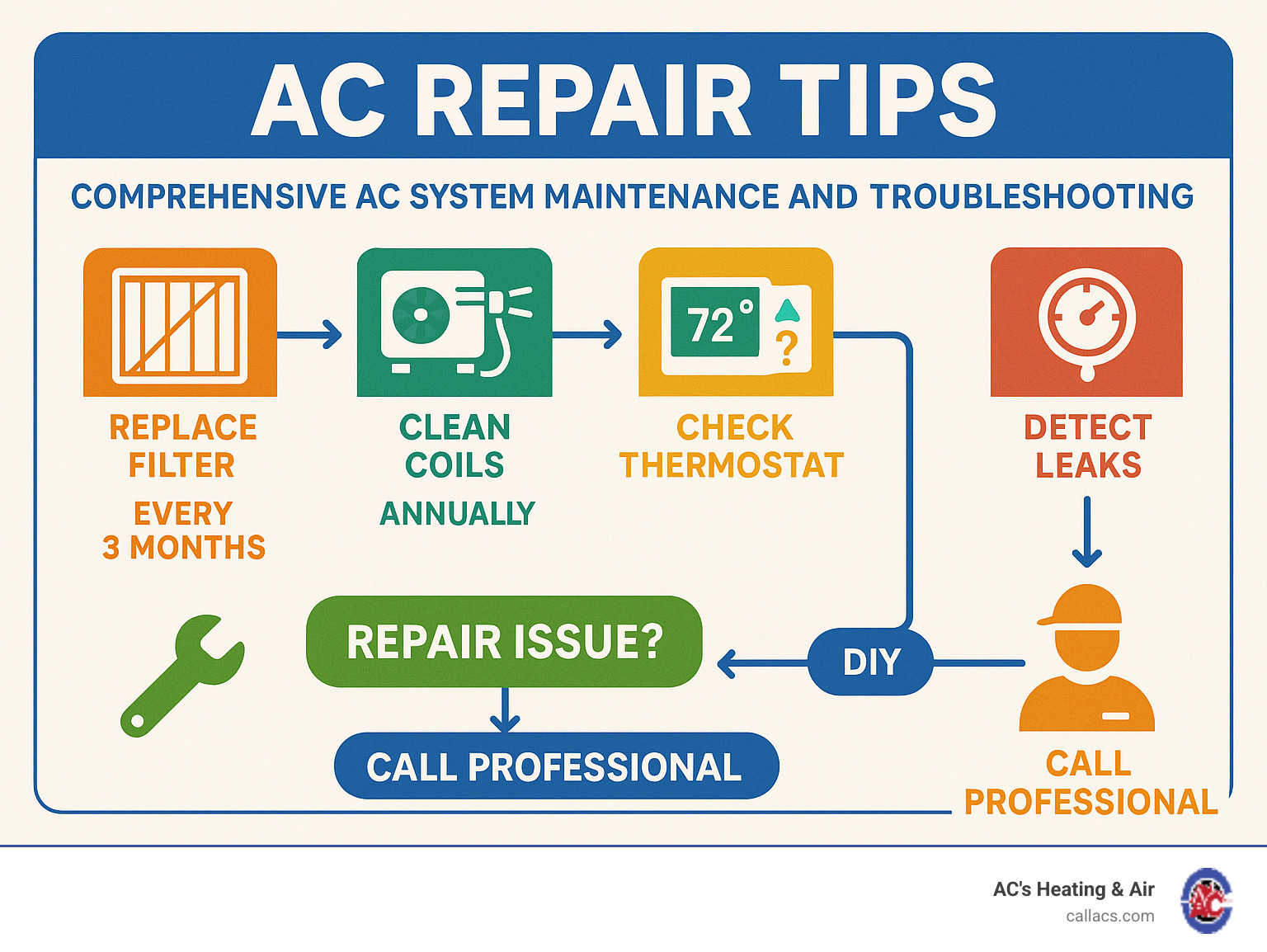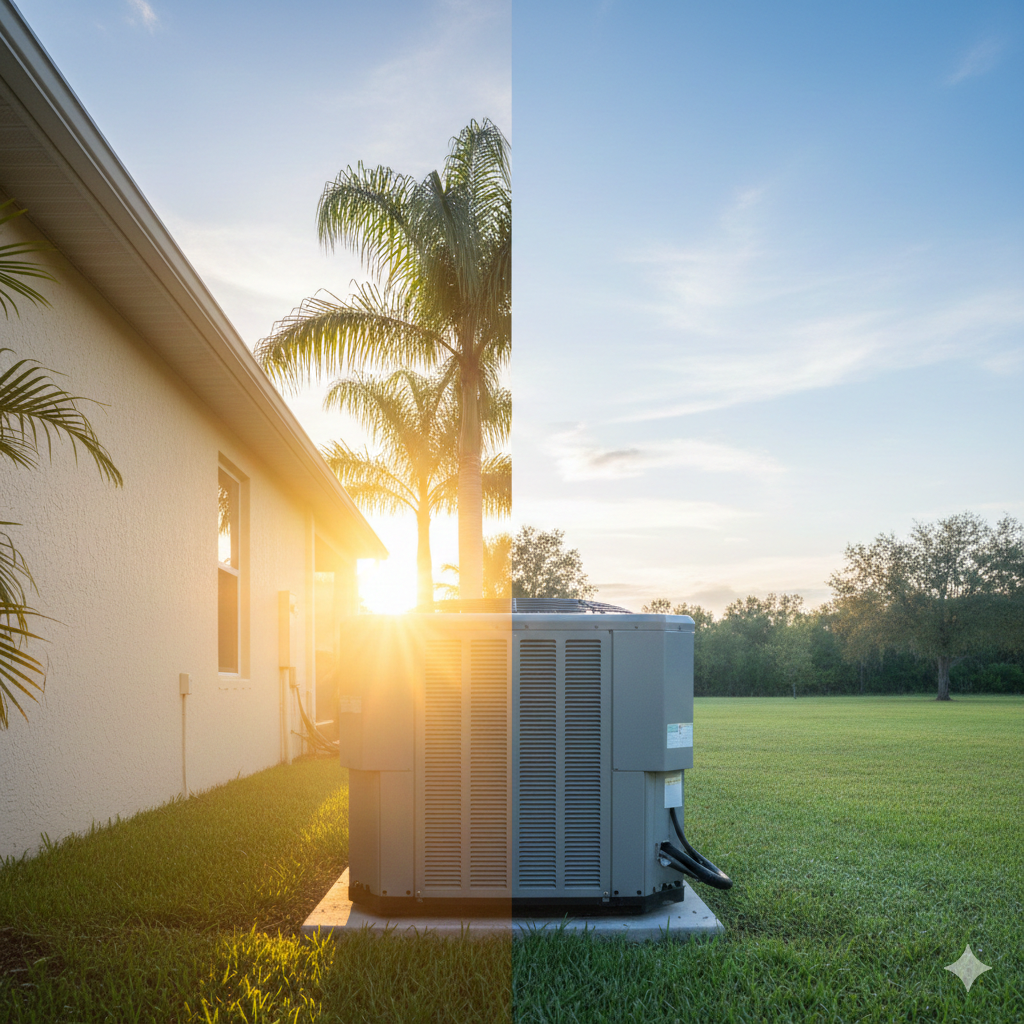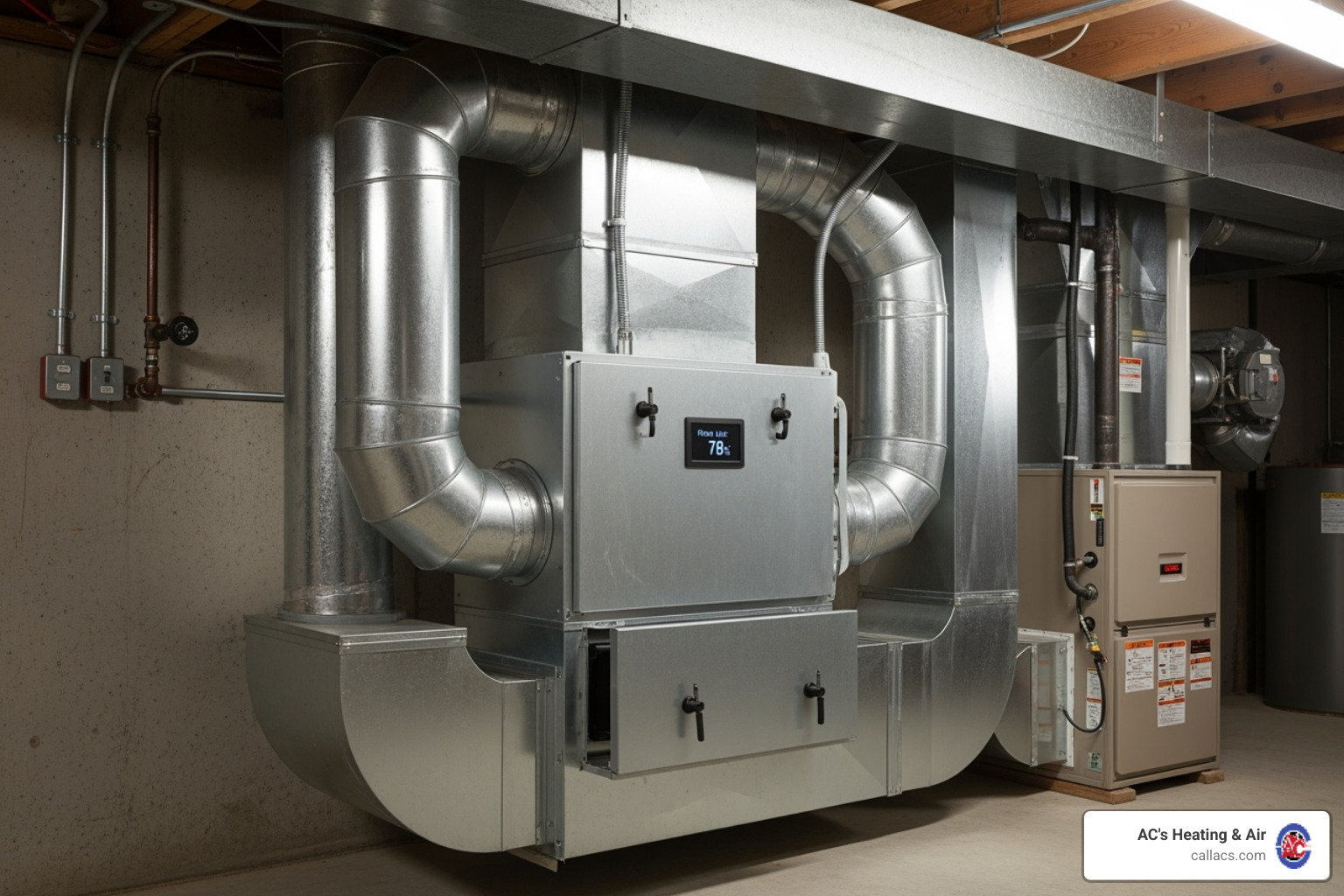Cool Solutions: DIY AC Repair Tips for Homeowners

Why AC Repair Tips Matter for Florida Homeowners
AC repair tips can save you hundreds of dollars and keep your home comfortable when Florida's heat hits hardest. U.S. homeowners spend about $29 billion annually on air conditioning energy costs, with the average AC repair ranging from $170 to $639.
Essential AC repair tips every homeowner should know:
- Check and replace filters monthly - can reduce energy consumption by up to 15%
- Clean outdoor condenser coils with a garden hose to maintain efficiency
- Keep 2-3 feet clearance around your outdoor unit for proper airflow
- Reset circuit breakers before calling for service
- Test thermostat batteries and settings when cooling seems inadequate
- Clear condensate drain lines to prevent water damage and shutdowns
Most homeowners comfortable with basic tools can safely handle common AC repairs themselves, potentially saving the cost of a service call.
When to call a professional:- Refrigerant leaks or electrical burning smells- Compressor or motor failures
- Repeated circuit breaker trips- Ice buildup that returns after filter changes
I'm Allen Chenault, owner of AC's Heating & Air with over 20 years of HVAC experience helping Central Florida homeowners master essential ac repair tips. I've seen how simple maintenance can prevent costly breakdowns and extend system life significantly.

Ac repair tips terminology: - Best HVAC system, - Winter Park AC Installation, -Fall HVAC maintenance tips
AC Anatomy & Common Breakdowns
Understanding your air conditioning system helps those mysterious AC repair tips make sense. Your central AC has two main sections: indoor and outdoor units.

Inside your home, the evaporator coil sits in your air handler, absorbing heat from indoor air. Your thermostat serves as the brain, controlling when the system operates.
Outside, your condenser coil releases absorbed heat into outdoor air. The compressor pumps refrigerant through the system, while the condenser fan helps dump heat.
Florida's dusty conditions and humidity create predictable problems. About 80% of our summer service calls trace back to dirty filters choking the system.
Warm air blowing from vents often means your evaporator coil is frozen or your system is low on refrigerant. Frequent on-off cycling typically points to a clogged condenser or dirty filter restricting airflow.
Unusual sounds - grinding, squealing, or banging - are your system's cry for help. Ice formation on coils might seem refreshing in Florida heat, but it's actually strangling your system. When airflow gets restricted, the evaporator coil gets too cold and freezes up.
Rising energy bills without increased usage often means clogged condenser coils forcing your system to work overtime.
Essential AC Repair Tips You Can Do Today
Many common air conditioning problems have simple solutions you can tackle yourself with basic tools and know-how.

Safety first: Always turn off power at both the thermostat and circuit breaker before starting any work. Keep a voltage tester handy and wear safety glasses and gloves.
Start with these game-changing repairs: Check your circuit breaker - tripped breakers cause more "broken" AC calls than you'd believe. Replace thermostat batteries because low batteries make your system behave erratically.
The filter swap might be the most important thing you do all summer. A clogged filter reduces efficiency and can damage your system. Rinse condenser coils on your outdoor unit with a garden hose - years of Florida dust and pollen build up there.
Straighten bent coil fins with a fin comb tool, flush drain lines to prevent water leaks, and maintain 2-3 feet of clearance around your outdoor unit.
For deeper guidance, check our AC Troubleshooting Tips and AC Running But Not Cooling resources.
Quick AC Repair Tips for an AC That Won't Turn On
When your AC won't start, check these items before calling for help:
Start with the circuit breaker. If tripped, flip it completely OFF first, then back to ON. Wait 30 minutes before testing - many AC units have built-in delay timers.
Test the fuses in the disconnect box near your outdoor unit. Use a multimeter - any numerical reading means the fuse is good.
Inspect the capacitor carefully. This cylindrical component stores electrical charge even when power is off. Look for bulging sides, oily leaks, or corrosion.
Double-check thermostat settings. Set to COOL mode and drop temperature 5 degrees below room temperature. Replace batteries if display looks dim.
When these steps don't work, you're likely dealing with compressor or internal electrical issues requiring our AC Repair 24/7 service.
AC Repair Tips When the System Isn't Cooling
Filter problems top the list. If you can't see through your filter clearly, replace it immediately. A dirty filter can drop efficiency by 15% or more.
Check your outdoor unit. Ensure the condenser fan spins when the system runs. Clean condenser coils with gentle garden hose spray and clear debris within 2-3 feet.
Ice buildup requires patience. Turn thermostat to OFF but leave fan ON to melt ice. This can take hours depending on ice formation. Replace your filter during this time.
Inspect refrigerant lines for oily spots, damaged insulation, or hissing sounds - all signs of leaks requiring professional handling.
If these steps don't restore cooling, our AC Repair Near Me service covers Central Florida.
Filter Care: The 15% Energy Saver

Proper filter maintenance can slash energy consumption by up to 15% while extending system lifespan.
Replacement schedule: Standard homes need changes every 90 days, homes with pets every 60 days, and dusty areas require monthly checks.
MERV 5-8 filters work well for most homes, capturing dust and pollen without restricting airflow. Higher MERV ratings provide better filtration but may restrict airflow in residential systems.
Smart management: Set phone reminders, buy filters in bulk, and write installation dates on filter frames. Many smart thermostats remind you based on runtime hours.
Keep spare filters on hand and check them regularly - this prevents more AC problems than any other single action.
Maintenance Moves to Prevent Future Failures
Spending a little time now saves you a lot of money later. Most preventive maintenance takes just minutes and can extend your system's life by years.
Spring preparation sets the stage for trouble-free cooling. Before the first hot day, replace air filters and buy extras. Clean condenser coils with gentle garden hose spray - this can improve efficiency by up to 30%.
Clear vegetation and debris from around your outdoor unit, maintaining 2-3 feet of breathing room. Check refrigerant lines for damage and test your thermostat.
Summer monitoring becomes routine once established. Check filters monthly during peak usage and listen for unusual sounds. Keep vents unobstructed - furniture or curtains blocking airflow make systems work twice as hard.
Fall preparation in Central Florida means getting ready for next year. Clean or replace filters before reducing usage, and schedule your annual professional tune-up.
Energy-saving strategies work with maintenance. Ceiling fans reduce cooling costs by 4-8% through better air circulation. Raising your thermostat 7-10 degrees when away saves up to 10% on cooling costs.
Seal ductwork leaks you can access and add insulation to reduce cooling load.
For detailed guidance, check our AC Maintenance Tips and the Department of Energy's maintaining your air conditioner resources.
Professional tune-ups extend equipment lifespan by 5-10 years and reduce energy consumption by 10-15%. Most importantly, they prevent about 85% of potential breakdowns and keep warranties valid.
We schedule most Central Florida customers for spring tune-ups in March or early April before real heat arrives. It's easier to address small issues in mild weather than during summer emergencies.
Consistency is key - a few minutes of monthly attention beats hours of frustration and expensive repairs later.
Know When to Call a Pro & What It Costs
While many ac repair tips can be handled by homeowners, some situations require professional expertise
Call professionals immediately for electrical burning odors - shut off your system and call for help. Loud grinding or metal-on-metal noises indicate serious internal damage requiring specialized tools.
When circuit breakers keep tripping repeatedly after you've cleaned filters and cleared debris, you're dealing with electrical problems needing professional diagnosis.
Refrigerant leaks require EPA-certified technicians. Look for oily spots around refrigerant lines or hissing sounds. Don't attempt DIY fixes - it's illegal and dangerous.
If ice keeps forming after filter replacement and airflow improvements, the problem runs deeper and needs professional equipment for accurate diagnosis.
Many HVAC professionals use the 5,000 rule: multiply repair cost by unit age in years. If that exceeds $5,000, replacement often makes more financial sense.
Typical repair costs range from $170 to $639 for common repairs, while annual maintenance runs $65 to $200. For detailed pricing, see HomeAdvisor's cost guide and our Affordable AC Repair Orlando service.
Professional service provides warranty protection, safety compliance, and comprehensive diagnosis using specialized tools that often reveal underlying issues homeowners miss.
When choosing service providers, verify NATE and EPA certifications, licensing and insurance in Florida, and ask for local references.
At AC's Heating & Air, we've served Central Florida communities including Apopka, Winter Park, Orlando, and Winter Garden since 2011, combining smart ac repair tips with professional expertise when needed.
Tools, Safety & Environmental Essentials
Having the right tools makes AC repair tips safer and more effective. Most DIY disasters happen when people work without proper equipment or skip safety steps.

Your basic toolkit should include a multimeter for testing electrical components, insulated screwdrivers for electrical work, and a fin comb for straightening condenser coil fins.
A wet/dry vacuum clears clogged drain lines, while a garden hose with adjustable nozzle cleans condenser coils. A good flashlight or headlamp helps you see components in dark corners.
Safety equipment isn't optional. Safety glasses protect from flying debris, insulated work gloves prevent electrical shocks, and a non-contact voltage tester verifies power is off before work begins.
Always keep a dust mask or N95 respirator handy - Florida's humid climate creates perfect mold conditions in AC systems.
Critical safety rule: Always turn off power at both thermostat and circuit breaker before starting work.
Capacitors store electrical charge even when power is off and can deliver nasty shocks hours after shutdown. Always discharge them safely using an insulated screwdriver across terminals.
EPA regulations strictly control refrigerant handling - only certified technicians can legally work with these systems. If you suspect refrigerant leaks, call professionals.
Know your limits. While these ac repair tips cover common problems, refrigerant work, major electrical components, or system disassembly should be left to certified technicians.
The goal isn't becoming an HVAC technician overnight - it's handling basic maintenance safely while knowing when to call professionals like AC's Heating & Air for complex work.
Frequently Asked Questions About DIY AC Repair
These are the most common questions from homeowners tackling AC repair tips. Knowledge helps, but knowing your limits is equally important.
How do I detect and stop a refrigerant leak?
Refrigerant leaks often start small and worsen over time. You might notice your AC running longer but cooling less effectively, or rising energy bills without explanation.
Look for these signs: Hissing sounds around refrigerant lines, especially near joints. Oily spots or stains on concrete under your outdoor unit - refrigerant carries compressor oil when it leaks. Ice buildup on evaporator coils that returns after filter replacement.
What you can safely do: Visually inspect visible copper refrigerant lines for damage, dents, or corrosion. Check if foam insulation around lines is torn or missing.
Where DIY stops: You cannot legally add refrigerant without EPA certification. Attempting refrigerant leak repairs is illegal and dangerous - these chemicals can cause frostbite on contact.
How can I tell if my thermostat is the problem?
Thermostat issues are common and often have simple solutions.
Start with basics: Replace batteries if display looks dim or blank - weak batteries cause erratic behavior even if display appears fine. Double-check settings - ensure COOL mode and set temperature 5 degrees below room temperature.
Test accuracy: Place a reliable thermometer near your thermostat and wait 15 minutes. Readings differing by more than 2-3 degrees suggest calibration issues.
For technical users: Remove thermostat from wall plate (power off first) and inspect wiring for loose connections, corrosion, or overheating signs.
Modern smart thermostats often provide diagnostic information and can improve energy efficiency enough to pay for themselves in Florida's climate.
How should I winterize my AC unit?
Central Florida winterizing differs from colder climates since we occasionally use systems during winter.
For traditional central AC: Clean outdoor unit thoroughly, removing debris and vegetation. Clean coils one final time. If covering the unit, use only breathable covers designed for AC units - never plastic sheeting that traps moisture.
Inside preparation: Replace air filter before reducing usage and set thermostat to OFF or heat mode for heat pumps.
Critical for heat pump owners: Never cover heat pump outdoor units - they need winter operation for heating.
Spring preparation: Remove covers, inspect for winter damage, clear accumulated debris, and replace filters before first use.
In Central Florida, partial winterization often works better than complete shutdown for those occasional warm winter days.

Conclusion
These AC repair tips can save you significant money and keep your Central Florida home comfortable during unbearable summer heat. Homeowners who master basic maintenance techniques avoid costly emergency calls and dramatically extend their system's lifespan.
The simple truth: Regular filter replacement alone reduces energy consumption by up to 15%, while basic maintenance prevents about 85% of breakdowns we see. Combined with professional annual tune-ups, you're looking at extending your system's life by 5-10 years.
Most importantly - know when to call a professional. Your safety comes first, and complex electrical or refrigerant work should always be left to certified technicians. Attempting major repairs yourself can void warranties and create expensive problems.
At AC's Heating & Air, we've helped Central Florida families in Apopka, Winter Park, Orlando, and Winter Garden since 2011. Our NATE-certified technicians understand that the best repair is prevention. That's why we encourage proactive maintenance - checking filters monthly during peak season, keeping outdoor units clean, and addressing small issues before they become major headaches.
These ac repair tips handle many common problems, but don't hesitate to reach out when encountering something beyond your comfort zone. Professional maintenance prevents problems entirely, not just fixes them.
Ready to ensure your AC runs efficiently all year? Contact us today to schedule your professional tune-up or learn more about our comprehensive air conditioning repair services.
While these maintenance techniques save money and improve comfort, your safety and system warranty are worth investing in expert service when complex issues arise.



